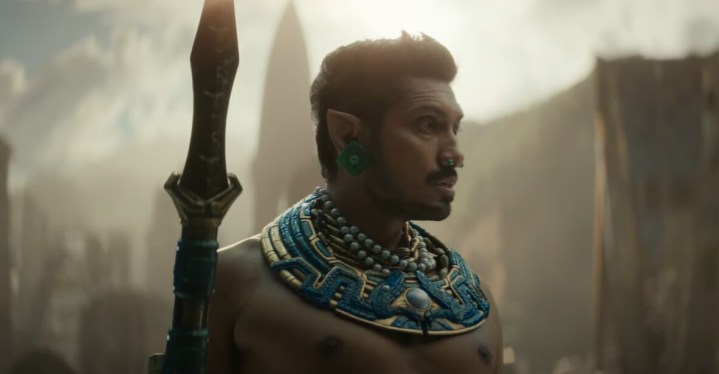‘Black Panther: Wakanda Forever’ Review: A Tribute That Resonates With Those Who Know Loss

Courtesy of Youtube/Marvel Entertainment
*NOTE: This Black Panther: Wakanda Forever review is spoiler-free*
Black Panther: Wakanda Forever is a movie Chadwick Boseman would be proud of.
It’s a thought that this reviewer had throughout the movie, as I was left the theater, and even as I’m writing this. He would be proud of Ryan Coogler, who told a story with so much love in his heart from the very moment the screen lit up, through every action sequence, and in every costume or set brought to life. He would be proud of his cast mates, every single one of them, for coming back when it’s hard and he’s gone, and creating something that will help heal everyone who watches. And he would be proud of every single movie go-er coming together, to pay tribute to those we have all lost.
Because yes, Wakanda Forever is a movie about saying goodbye to Boseman himself. This is his legacy and he has absolutely changed the lives of Black men, women, and children everywhere. He’s an icon. He’s a hero. And he will forever be missed. But Wakanda Forever is also about moving forward and through the grief that comes with loss and with an understanding that those we love will always be with us. Physically they might not be, but their memory still lives. Their love for you is still there. Their laugh, their hope, and the way they looked at us with this absolute certainty that you were going to do wonderous things…it’s still there.

That’s not to say that Wakanda Forever taught that lesson in the first five minutes and everything was set. And it also doesn’t mean that everyone went through the same journey. Loss is something personal. We can feel it together as a community when we have lost someone in common. But the way that we move through the world after that loss is personal.
That’s why it’s different for Ramonda (Angela Bassett), who has lost a son and is trying to rule Wakanda and protect her people while grieving. That’s why it’s different for Shuri (Letitia Wright), who has lost a brother and doesn’t know how to even begin grieving. Both mourn T’Challa. But they do it in different ways. And that is more than ok. Even Okoye (Danai Gurira) goes through it because she and T’Challa were friends. And this movie teaches you that there is no one way to do something as personal as grieving.
I will say there is one exploration of loss that I absolutely felt in my heart: Nakia’s loss and grief. Yes, T’Challa was Ramonda’s son, Shuri’s brother, and Okoye’s friend. And his loss was felt by everyone in Wakanda, including M’Baku, because he was their King and Protector. But Nakia (Lupita Nyong’o), her missing T’Challa comes from a place of losing a partner. (Something that isn’t a spoiler because they previously were together, everyone read the vibes, and we’ve seen the fanart. They are true love.) And from what we saw in the first Black Panther, the looks they gave each other were the forever kind of love. To lose that is devastating. And Wakanda Forever making time to explore her loss matters.

Then there’s Namor.
No one says, “Only the most broken people can be great leaders.” unless they have been through significant loss. That is grief, that is pain, and he has absolutely transformed that into the leader he is today. And honestly, there’s no one who could’ve brought this character to life better than Tenoch Huerta. He has this charisma to the moments when he wants you to think he’s someone easily defeated. And in the blink of an eye, Huerta transforms Namor into a warrior who will fight till his dying breath for those he deems his people. That makes for an interesting character and someone you want to cheer for even though he’s clearly engaging in battle with the Wakandans aka the people we have come to know and love throughout the years.
That takes me back to loss and grief.

Because what makes Wakanda Forever a success, what makes it a movie that you should be watching despite the ache in your chest that you know is coming because Coogler doesn’t do half-measures, is that it explores what happens when those who have experienced loss clash. Wakandans and the Talokan are not just two opposing forces going at it for funsies. There’s pain there and a need to protect one’s own. And it led this reviewer on a personal exploration as to who we are as communities who have been transformed or destroyed by loss, grief, or even by people who think that we are less than them. Who are we as individuals? Who are we as communities? And how do we work together with others as a means of moving forward?
Ultimately, Black Panther: Wakanda Forever is a balm to the very soul that puts Black healing front and center, while also inviting Latine people to the stage, so we can all move forward in this journey towards meaningful representation. It’s a movie about community. About all our people. And how once we process that loss, push through the grief, and hold onto those around us, we can move mountains.
And that’s especially true for the new Black Panther.

Black Panther: Wakanda Forever hits theaters on November 11, 2022.